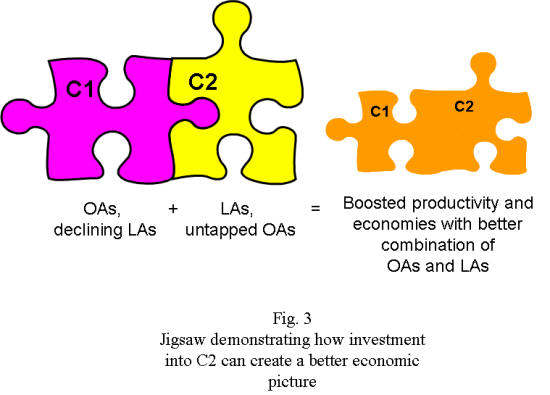 |
 |
|
UGF Lecture 6Management > Global Firm > Kojima > Case A > Case B > Conclusive remarks > Further analysis
Further analysisKojima wants to convey his message only in terms of macro-level location factor, but there are limitations that are resolved if the analysis is used to examine micro-level factors. These include firm-level OAs and types of strategic competitive behaviour. One key question in these terms is "how can it be that, in the case A, it is the least competitive industries in C1 that undertake the very difficult act of FDI and, in fact, do so in a way that can be highly beneficial for C2?" The answer to the question needs analysis of two sources of competitiveness for a national industry:
Thus Case A is one where the firms in C1 retain their OAs, whilst C1's LAs decline over time, such as rising labour costs, making it less efficient. Firms can use LAs in C2 to replace those in C1 (Fig.3).
By working with the latent comparative advantages in C2 the C1 firms bring the ideal firm-level capabilities (OAs) to develop these assets (LAs) into sources of growth in that economy.
This does not necessarily mean any kind of loss in C1. The resources no longer used in C1 can be redeployed, either into higher parts of the same industry or into other, technologically more advanced growth industries. The process of industrial restructuring in C1 could be supported by government policies. If the development process in C2 and the restructuring process in C1 occur effectively, then FDI can secure benefits of a new "international division of labour". It must be remembered that this type of FDI may also cause some problems.
|
|

